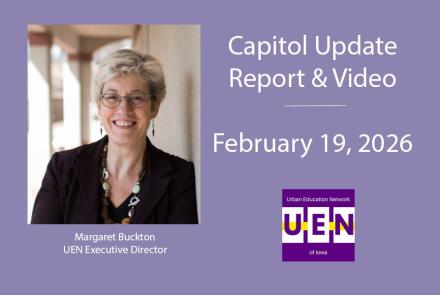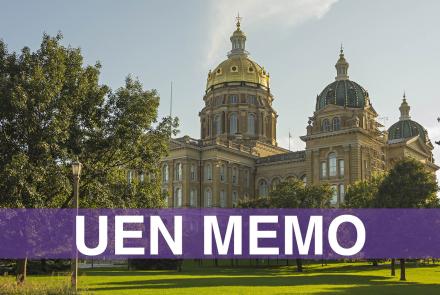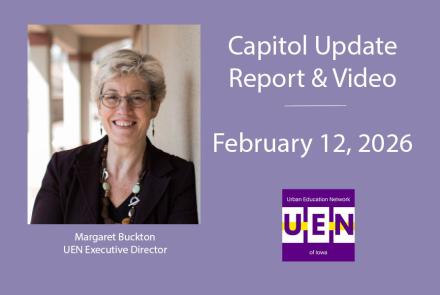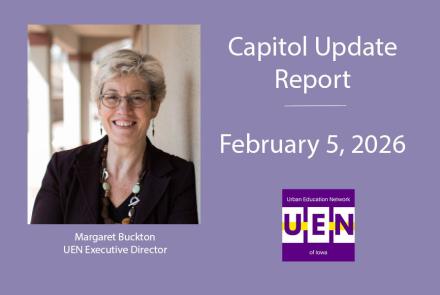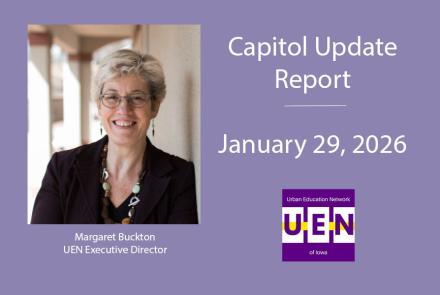Capitol Update - March 7, 2024
UEN Legislative Update
March 7, 2024
Download the Printable Version of this Weekly Report
This UEN Weekly Report from the 2024 Legislative Session includes:
- Teacher Pay Amended and Approved by the House
- AEA Reform Amendment in the Senate, but no Action
- SSA Still in the Senate
- SF 251 Administrative Expenditure Limitation Resurfaces
- Fiscal Notes: SF 2386 PK Expansion and SF 2398 Income Tax Reform
- Other Action this Week
- Advocacy Actions
- Links to Advocacy Resources
Teacher Pay by the House
HF 2630 Teacher and Education Support Pay was amended and approved by the House and moves to the Senate. The bill impacts three distinct areas of wages for school employees:
- Sets minimum teacher pay for FY 2024-25 at $47,500 and increases that to $50,000 for the FY 2025-26 school year. Requires DOM to calculate the Teacher Salary Supplement (TSS) per pupil necessary for each district to reach minimums, including the employer’s share of FICA and IPERS.
- Sets minimum hourly wages for education support personnel at $15 per hour. The bill appropriates $14 million for hourly pay for FY 2025, but caps the state expense at $14 million, requiring DOM to prorate the shortfall to districts if the $14 million is insufficient to cover the cost. Allows TSS to be used for educational support staff costs.
- Appropriates another $22 million for FY 2025, also through TSS, based on districts’ share of budget enrollment, to be used at the school district’s discretion to supplement teacher salaries and salaries and wages of education support personnel in a manner that promotes quality teaching and rewards experience.
- This TSS investment grows by SSA going forward.
The bill was amended on the floor with two additional provisions:
- Allows newly retired teachers, beginning July 1, 2024, to return to an IPERS employer after receiving one month of benefits (not requiring four months of bona fide retirement). Expires July 1, 2027.
- Notwithstands budget notice deadlines. Requires school districts to notify DOM of budget within 30 days of HF 2613 SSA is enacted, then requires counties to send out notices to taxpayers within 35 days of the enactment date. Does not appear to notwithstands the April 30 budget deadline. And March 15 is still the law at this point, so districts must proceed with current law until such time as the Senate might agree with these provisions and get both this bill and the SSA bill to the Governor.
The bill was amended and approved 93:1 in the House, sending it over to the Senate. Since this bill is an appropriations bill, the March 15 funnel deadline would not necessarily stop its progress. UEN is registered in support of the bill. See advocacy actions below.
AEA Reform in the Senate HF 2612
The Senate has an amendment filed to the House’s AEA proposal, HF 2612. See the amendment here S-5043. This is a strike-after amendment, which means that the amendment would entirely replace the bill if approved. The following details explain differences from the Senate’s original SF 2386 and some notes about how S-5043 differs from the House’s proposal:
- Limits AEAs to nine and keeps the AEA boards as governing boards working cooperatively with the DE and the Division of Special Education (DSE) regarding special education instead of the House’s advisory boards overseen by the state DE. Maintains AEA board authority (House makes AEA board advisory to the DSE).
- Requires public schools within boundaries to request education services for the next fiscal year by Feb. 1 of the preceding school year, requires AEAs to provide a method of payment and enter into an agreement. If requested by Feb. 1, AEAs may provide educational services. Limits contracts to those districts within the AEA (this provision seems to conflict with the “centers of excellence” concept later in this bill and could jeopardize district contracts with multiple AEAs for education and media services like PowerSchool with GWAEA and the purchasing coop with Keystone AEA).
- Limits AEA chief administrator salary to 125% of average superintendents in the AEA (does not use the House’s exclusion of shared superintendent salaries from the calculation). This provision is effective July 1, 2024.
- Keeps an annual report rather than the House’s quarterly report to school districts.
- Requires that the AEAs special education director be an employee of the DSE. Requires AEAs to terminate employment of AEA directors of special education and requires, within a reasonable time after July 1, 2024, DSE to employ at least one individual to serve as director of special education within each AEA. Requires DSE to give preference to terminated AEA employees.
- AEA Board changes – Requires nine members, of which four must be superintendents elected by superintendents in the AEA. Allows the superintendent to designate an individual to serve for the duration of their term. (House requires five superintendents with no authority to delegate.) Includes transitional language on vacancies, terms and director district convention.
- Accreditation Processes and Standards:
- Requires accreditation processes developed by the DSE in consultation with AEAs . Gives authority to DSE to require either merger or outsourcing if deficiencies are not corrected. (House has DE director working with State Board to develop standards and DE director orders deficient actions.)
- Accreditation Standards set by state BOE in consultation with DSE (in House its consultation with DE) effective July 1, 2025.
- The Senate’s list of accreditation standards includes references to all students from HF 2612 (e.g., curriculum and instruction support for all students, including students with disabilities), and adds one more change requiring a program and services evaluation and reporting system that includes information related to special education. (House version left out that phrase, which would limit the system to just special education evaluation). S-5043 also includes timely submission of required reports and documents to the State BOE, DE, and DSE (not included in House standards).
- Funding: Maintains FY 2025 Senate formula (all SPED to AEAs, 40% of media and educational services to AEAs, AEA TSS and AEA PD to AEAs). Changes FY 2026 to include 10% of special education funding to AEAs, plus TSS and PD to AEAs. (The balance, 90% of special education funding, all media and all special education services to school districts.)
- Keeps Teacher Pay with a minimum of $46,251 from the original SF 2386 distributed through the TSS calculation.
- Specifies more details about an annual report on administrative cost savings.
- Adds recommendations of the Nonpublic Schools SPED task force identical to the House.
The bill with the amendment has been on the daily debate calendar all week, with no Senate action. UEN is registered as undecided on the Senate bill and also on the House’s bill HF 2612. See advocacy actions below.
SSA Still in the Senate
HF 2613 SSA, which establishes a 3% increase in the State Cost Per Pupil, was approved on February 22 in the House, sending it to the Senate, where it sits on the Senate Calendar. See the Feb. 23 weekly report for details of the bill. The Senate’s version, SF 2258 does not have a percentage increase specified. It is likely that differences in the total cost of various teacher pay proposals and other state budget priorities are influencing differences in school funding totals, as the House, Senate and Governor strive for consensus on the SSA rate. See advocacy actions below. UEN is registered in support of HF 2613, which is the highest increase proposed and, in concert with HF 2611 Teacher Pay Investments, would exceed the current inflation rate.
SF 251 Administrative Expenditure Limitation Resurfaces
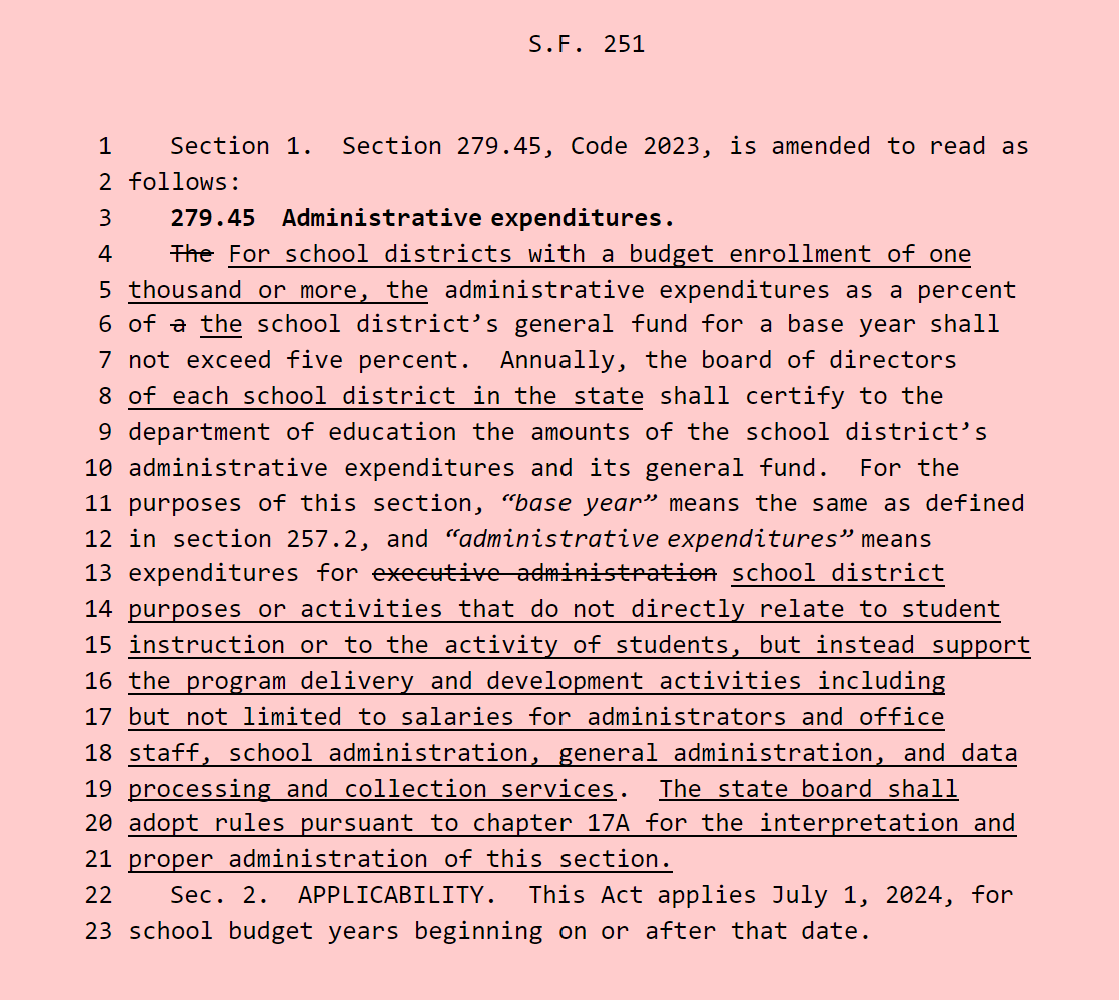
SF 2398 Income Tax Reform Fiscal Note
A Fiscal Note was published on March 1, estimating the impact of the Senate Ways and Means Committee income tax proposed. Figures 1 and 2 of the fiscal note show the tax rates.
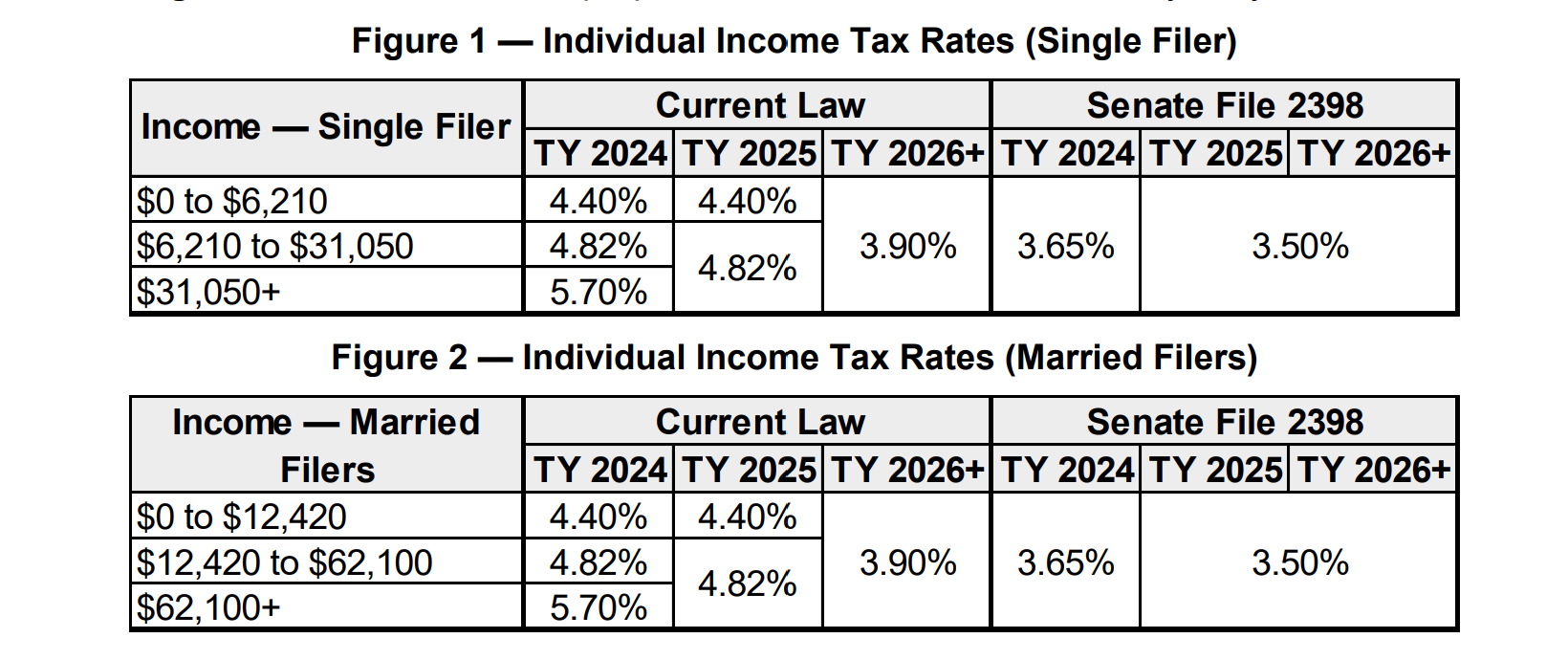
LSA’s Fiscal Note anticipates the following impact on the State General Fund and on School Income Surtaxes. Note: the income surtax provisions do not lower revenues for school districts but would instead shift the burden to local property taxes. The bill is on the Senate Calendar. UEN is opposed.
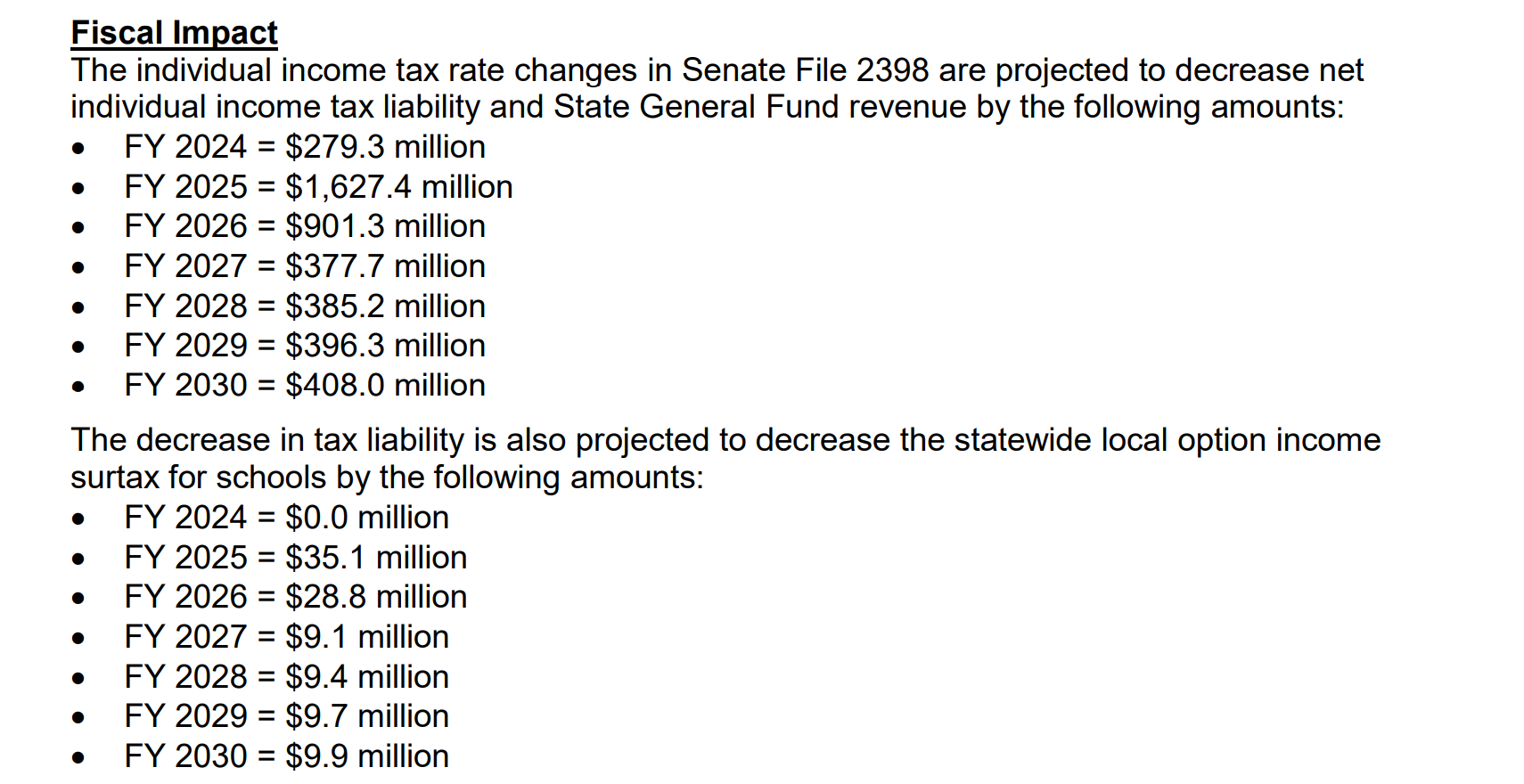
Fiscal Note for SF 2383 Preschool Expansion
A fiscal note was filed on March 4 estimating the fiscal impact to the state of the proposed 1.0 weighting for preschool students from low-income families for full-day programming. The fiscal note describes the requirements of the bill: Allows schools to choose between the 10 hours of instruction for voluntary preschool programs or adding heightened programs (15 hours of instruction, increasing to 20 hours in FY 2026) for children in families at 185% of the FPL. Allows those families to choose which preschool program to place a child in. Changes the formula for determining preschool aid.
The Fiscal Note States: “The LSA cannot estimate the impact due to uncertainty about how many families will take advantage of the new program but estimates that if approximately 20% of the current voluntary school preschool students qualify and use the program, the impact will be about $12.5 million.” The bill is on the Senate Calendar since Feb. 15 without further consideration. The fiscal impact of the bill may be tied up with other school funding decisions pending. UEN is registered in support.
Other Action This Week
HF 2278 Open Enrollment Transportation: allows a receiving district with fewer than 2,000 students to send a bus not more than 2 miles into the district of residence to pick up an open-enrolled student if the student lives closer to the school the student attends than the school of residence. Retaliation option: allows a receiving district of more than 2,000 students to send a bus into a contiguous district if that district is less than 2,000 students, and the district of residence has sent vehicles into the receiving district. Allows receiving and sending school districts to continue to reach an agreement on sending transportation into the district of residence. A Subcommittee of Senators Green, Westrich and Giddens moved the bill forward to the full Senate Education Committee. UEN is undecided.
HF 2393 Student Dental Exam: exempts dental exams for students from restrictions on physical exams, similar to exemptions for hearing and vision. A Subcommittee of Senators Green, Garrett, and Trone Garriott moved the bill forward to the full Education Committee. UEN supports.
HF 2545 DE High School Review: Requires DE to review high school graduation requirements, core content, core curriculum and to make policy recommendations. The recommendations must include:
- a plan to regularly review and revise English language arts, math, science, and social studies core content standards (including a focus on US history, western civilization, and civics).
- a plan to make Iowa’s educational standards the best in the nation.
- input from relevant stakeholders (including teachers and parents).
- increase the quality of instructional curriculum and maximize local flexibility in graduation requirements and course offerings while maintaining the goal of all HS graduates having necessary skills at graduation, including sufficient knowledge of civics, opportunities to equip high school graduates with sufficient knowledge of civics and US history and the US Constitution, so that high school students are capable of discharging the responsibilities of citizenship.
- a statewide literacy plan to increase student proficiency using systematic and sequential approaches to teaching phonetic awareness, phonics, vocabulary, fluency and text comprehension (components of the Science of Reading).
Requires the report of recommendation to the General Assembly by December 2024. Requires the DE to include an internet link for comments by the public and stakeholders. A Subcommittee of Sens. Zahn, J. Taylor and Donahue moved the bill forward to the full Education Committee. UEN is undecided.
HF 2586 School Guards and Guns: current law allows school boards to determine whether staff should be allowed to carry guns. In the few cases where it was attempted, there was no insurance coverage for the school district; which is a good indication that negative results are possible. The bill states that the staff member has immunity from liability. Adds a professional carry certification training for staff members authorized by the school district to carry guns. The original bill would have mandated every school district with over 8,000 students enrolled be required to have a school resource officer or private security office in every high school. That original language was removed, allowing school boards to opt out of the SRO requirement. Passed 58-37, over to the Senate. A Subcommittee of Senators Evans, Garrett and Quirmbach moved the bill forward to the Senate Education Committee, 2:0. Although originally opposed, with the House amendment to allow school boards in districts over 8,000 enrollment opt out of the requirement to have SROs in every high school, UEN is now undecided.
HF 2615 College Information to HS Students: requires community colleges and universities to publish information on income related to different degrees and student loan debt. Requires high schools give this information to juniors and seniors interested in college. Makes the school college and career transition counselor (if a school district has one) responsible for sharing this information with students. Excludes a shared college and career counselor from counting against the 21-student limited weighting for operational sharing. A Subcommittee of Senators Green, Garrett and Trone Garriott moved the bill forward to the full Education Committee. UEN supports.
HF 2631 Therapeutic Classroom Claims: authorizes the DE to transfer any remaining funds from the appropriation for reimbursement of transportation claims for therapeutic classroom services to the Therapeutic Classroom Incentive fund. The bill was approved by the House 90:0 and moves to the Senate. UEN supports.
HF 2643 Dyslexia Endorsement (formerly HF 2733): Appropriates $335,000 to DE for grants to help teachers obtain an advanced dyslexia specialist endorsement. Approved by the House Appropriations Committee 25:0, sending it to the House Calendar. UEN supports.
HF 2652 School Safety (formerly HSB 692): Requires schools to do comprehensive safety reviews of school buildings. Makes such reviews confidential records. Requires schools to have a radio that can access the statewide inoperable network. Requires the DHS/ED to establish an emergency radio grant program. Appropriates $3 million for grants. Requires the DHS/ED to establish a firearms detection grant program and appropriates $350,000 for the program. Requires the DPS, with the DE and the DHS/ED, to establish a task force on school safety standards and requires a report by December 2024. Prohibits schools from issuing bonds for school athletic facilities projects that are not in compliance with (future) safety standards. Amended and approved by the House Appropriations Committee, 16-9. UEN was undecided on the original bill, but has concerns about the amendment, so we are analyzing the changes to determine if we need to change our position. Stay tuned.
HF 2653 Perry Retention Bonuses (formerly HSB 728) Allows school districts to use the district management levy to pay for retention bonuses for school employees, if the school is the subject of a disaster proclamation and in three counties (which is the Perry School district). Limits the payments to $700,000. Approved by the House Appropriations Committee, 25:0 and moves to the House Calendar. UEN supports.
SF 2191 Active Shooter Alarms (formerly SF 2017): Requires schools, including charter schools, to have a policy on how students, employees and others are to respond to a fire alarm set off due to an active shooter. The Senate passed the bill 46-0, sending it to the House. UEN is undecided.
SF 2196 School Vaccination Information: Requires school communications to include information on exemptions when communicating with parents about vaccination requirements. Requires schools to post exemption information on the internet. The Senate passed the bill 31-15, sending it to the House. UEN is undecided.
SF 2331 Government Notice in Newspaper: Requires that cities deliver minutes of council meetings to newspapers for publication within 15 days. Requires the newspaper of notice to have been published for at least one year and that the official publications be available at the website of the paper at no cost to the public. Requires the paper post to a statewide notice site. Requires a statewide newspaper organization to maintain such a site (which is the Iowa Newspaper Association). Allows notice requirements to be satisfied by internet publication. Allows a county to publish on the internet if no newspaper meeting the requirements for official publication exists in the county or if a newspaper refuses publication. Deems notice requirements to be met if the governmental body publishes notice on the internet even if the newspaper fails to publish the notice. Requires notices to be published within 72 hours of receipt. Requires the newspaper to refund any money paid for notices not published in a timely manner. Gives the Iowa Public Information Board jurisdiction over disputes about notice publication between governments and newspapers. Approved by the House State Government Committee, 23-0., moving it to the Senate Calendar. UEN supports.
Advocacy Actions This Week on School Funding, Teacher Pay, AEA Reform, Charter School/Open Enrollment Equity:
Adequate School Funding: the House’s 3%, HF 2613, would fall short, but for the commitment to fund teacher salary increases, including the sustainable appropriation of $22 million. See the UEN Issue Brief for additional information. Contact Senators and ask them to support the House recommendation of 3% soon, and confirm a commitment for additional teacher pay in HF 2630. Additional supports:
School districts are up against new property tax publication timelines, which are extremely difficult to meet with the lack of certainty about how much funding will be available. Different SSA rates result in different property tax rates, which have to be communicated to the public. The deadline to report to the county for the mailing of property tax statements is March 15.
See the UEN website for an UEN Issue Brief providing education funding history, comparing total Iowa education expenditures per pupil, which most recently ranked our state as 35th in the nation, now spending more than $3,000 per student LESS than the national average, and including some talking points to help you advocate with your legislators. UEN’s Legislative Priority supports an SSA rate that at least matches the inflation rate schools are experiencing.
FY 2025 ISFIS New Authority Calculator allows users to set the SSA rate and calculate the impact for all districts for FY 2025 on your regular program (not including special education or other supplemental weightings or categoricals). Enter the SSA percentage increase and your Budget Enrollment and you can compare to the new money you’d receive if the SSA rate matched inflation (either 3.1% for CPI and 4% for Core Inflation) compared to the 3% set by HF 2613.
SF 251 Administrative Expenditure Limitation: Contact House Education Committee Members and ask them to oppose the bill. What problem is this bill intended to solve? Refresh your memory with last year’s UEN Call to Action found here: https://www.uen-ia.org/call-action-sf-251-administrative-expenditure-limitation, which included the following Key Messages:
Ask Representatives to oppose SF 251 Administrative Expenditure Limitation.
- The definition of administration in SF 251 is very broad and leaves the DE little discretion to align with accounting codes already required to be reported.
- Every district would be out of compliance if the limitation is set at 5% and would have to cut expenditures and lay off staff to comply.
- Much of the growth in non-teaching positions since 1993 is due to mandates and requirements of state and federal government, changes in student needs and increased requirements for the use of data systems. See district-specific data on the FTE growth spreadsheet shared last year by Sen. Zaun (Bill Sponsor and Floor Manager) District Staffing Surge 1993 to 2021. Confirm the changes in your district and explain why those numbers have grown faster than the FTE teacher count.
- Forced reduction of administrative and support staff would increase the workload of teachers.
- See NCES data per district with their definition of administrative expenditures (Executive plus school administration) posted here NCES Data 2019 by Admin Expenditures Percentage.
AEA and Teacher Pay Bill: Both now in the Senate. Contact senators to support HF 2630 Teacher and Education Professional pay. Also, ask them to continue to work on the AEA bill to include locally elected AEA boards with Authority (this is in the Senate version), be thoughtful about the timeline so school districts and AEAs can plan, consider the implications of special education funding and equity depending on which concept of special education flow-through is considered, and ask them to support a diminished state DE presence, although some is acceptable for special education compliance. See the article above for provisions your school districts might support, have questions about, or oppose. Keep reaching out and connecting, so when something does move, they will remember your concerns.
Quality Preschool and Other UEN Priorities: Continue to talk about the value of Quality Preschool, and Teacher and other Staff Shortages. SF 2383 Expanded Preschool is on the Senate Calendar may be in trouble due to the estimated impact of the bill on the state budget. The bill is phased in over two years, up to 1.0 weighting for students below 185% of the federal poverty level. Contact Senators to support it. Find Issue Briefs and other resources on the UEN Advocacy website to find talking points or other resources to share when you meet with policymakers.
Charter School and Open Enrollment Funding and Right of First Refusal on School District Property: UEN is opposed to these bills, HF 2543 on the House Calendar and SF 2368 on the Senate Calendar, which would require categorical funds TSS, PD and EICS to follow students to both charter schools and receiving districts. These bills also require school districts, when selling or leasing property, to grant Charter Schools the right of first refusal, regardless of economic development or community housing or child care needs that might be more appropriate for the use of the property. See the article and description in the Feb. 23 UEN Weekly Report. Encourage members in both chambers to limit the impact, avoid furthering other inequities, and study the implications during the School Finance Interim Committee this Fall.
Connecting with Legislators: To call and leave a message at the Statehouse during the legislative session, the House switchboard operator number is 515.281.3221 and the Senate switchboard operator number is 515.281.3371. You can ask if they are available or leave a message for them to call you back. You can also ask them what’s the best way to contact them during session. They may prefer email or text message or phone call based on their personal preferences.
Find biographical information about legislators gleaned from their election websites on the ISFIS site here: http://www.iowaschoolfinance.com/legislative_bios. Learn about your new representatives and senators or find out something you don’t know about incumbents.
Find out who your legislators are through the interactive map or address search posted on the Legislative Website here: https://www.legis.iowa.gov/legislators/find
UEN Advocacy Resources: Check out the UEN Website at www.uen-ia.org to find Issue Briefs, UEN Weekly Update Legislative Reports and Videos, UEN Calls to Action when immediate advocacy action is required, testimony presented to the State Board of Education, the DE or any legislative committee or public hearing, and links to fiscal information that may inform your work. The latest legislative actions from the Statehouse will be posted at: www.uen-ia.org/blogs-list. See the 2024 UEN Advocacy Handbook, which is also available from the subscriber section of the UEN website.
Contact us with any questions, feedback or suggestions to better prepare your advocacy work:
Margaret Buckton
UEN Executive Director/Legislative Analyst
margaret@iowaschoolfinance.com
515.201.3755 Cell
Thanks to our UEN Corporate Sponsors:
Special thank you to your UEN Corporate Sponsors for their support of UEN programs and services. Find information about how these organizations may help your district on the Corporate Sponsor page of the UEN website at www.uen-ia.org/uen-sponsors.
- Public Progress LLC - thepublicprogress.com
- Solution Tree - www.solutiontree.com/st-states/iowa


